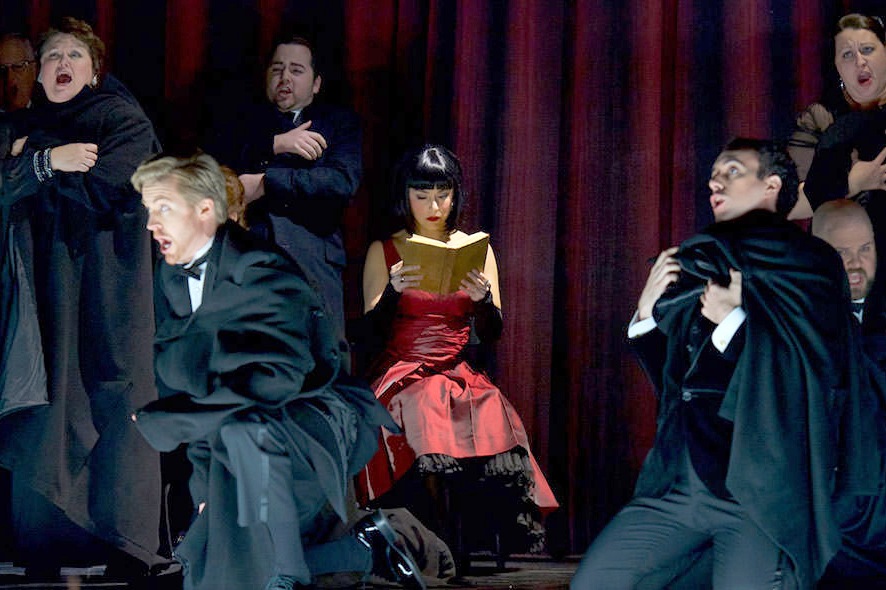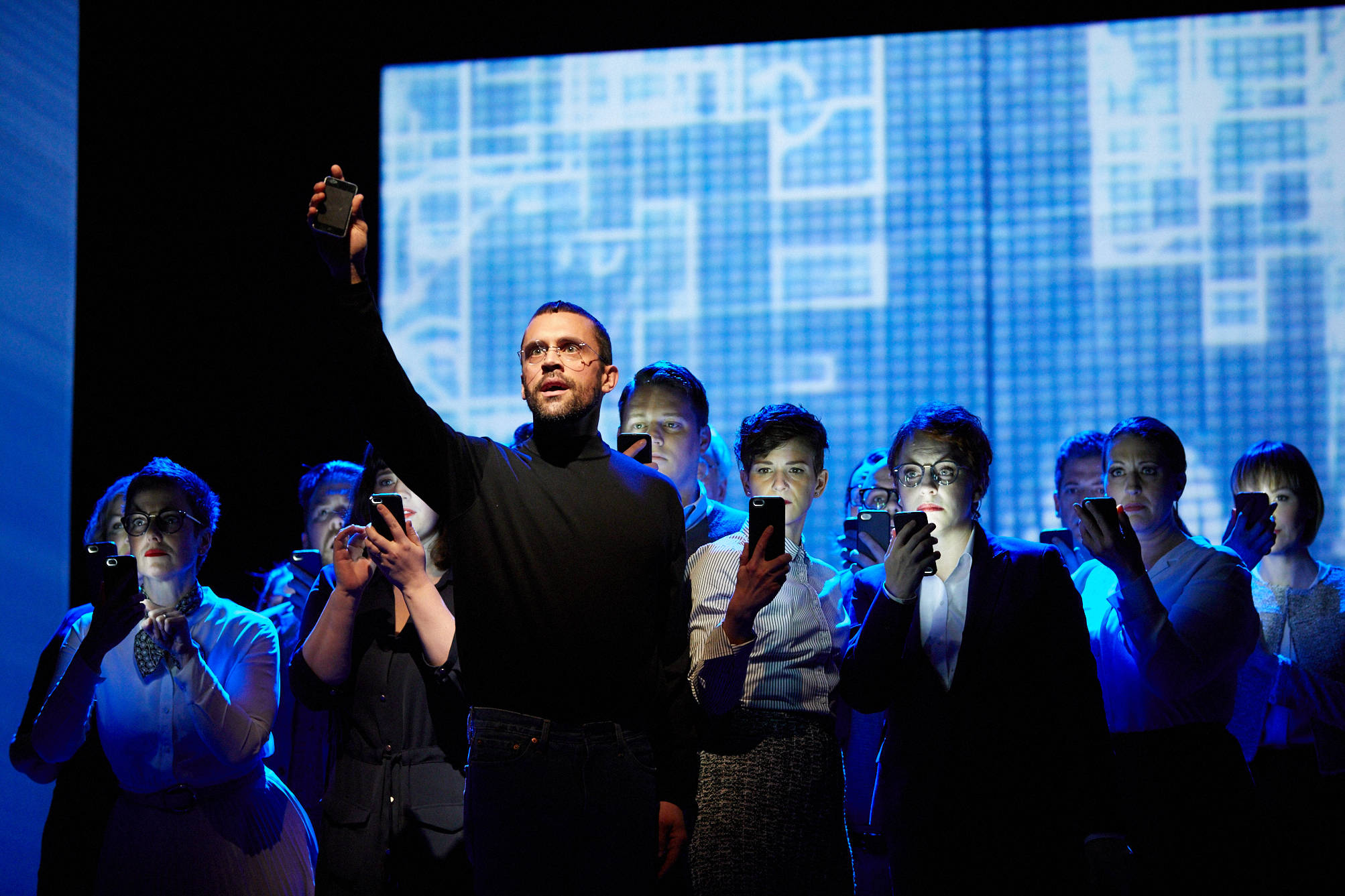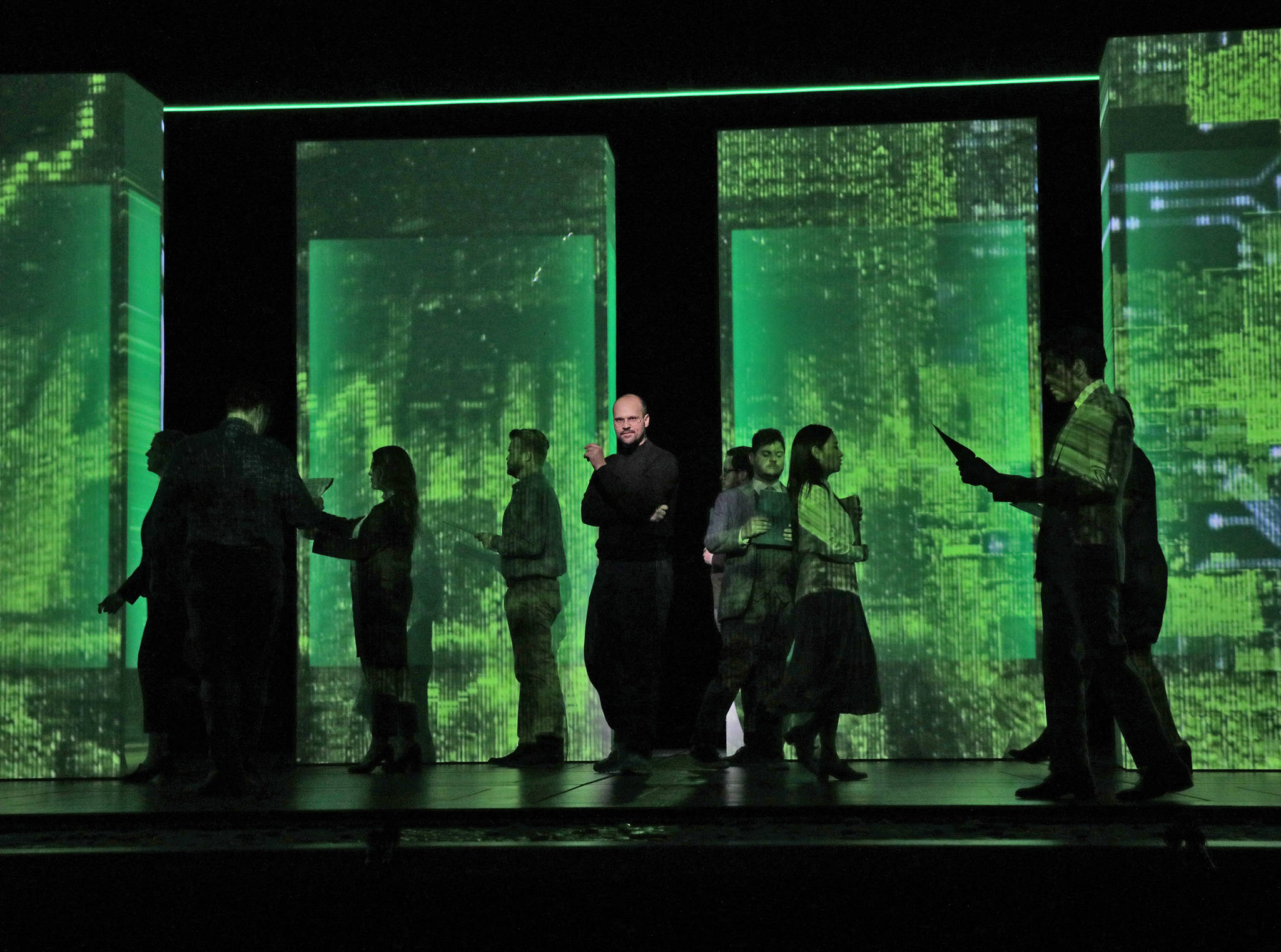Times are tough all over. Ever since the ex-courtesan Violetta, whose story Verdi tells in La traviata, moved in with her admirer Alfredo, she’s brought in no income, and has had to start selling her belongings (instead of her goods). Seemingly in sympathy, Seattle Opera’s dismissed a third of the work’s orchestra and cut at least 20 minutes from it.
The company’s production—I’m really tempted to put that word in irony quotes—opened Saturday, and is sure to provoke controversy. Most obviously, there is no set—literally no set. McCaw Hall’s red curtain opens to reveal another, then a third, and these plus one chair and a pile of books constitute all you see onstage in director Peter Konwitschny’s conception of Verdi’s 1853 romance. SO’s staging of Donizetti’s Maria Stuarda last March was similarly pared down (albeit not so drastically), but it worked wonders, bringing fluidity to an opera whose formulaic structure risks stodginess. The lack of a naturalistic period set made the piece lighter on its feet. Here, that lack—in a larger sense, Konwitschny’s decision not to anchor the story in any specific time or place—makes Traviata’s central conflict even harder than usual to bring off, and nearly kills its emotional impact.
Its dramatic crux comes as Alfredo’s father Germont bullies Violetta into leaving Alfredo, since his son’s dalliance with a demimondaine endangers his daughter’s marriage prospects. Germont’s demand and Violetta’s capitulation, unbudgeably grounded in 19th-century mores, are not universally relatable impulses, so simply putting the cast in tuxes and little black dresses (and leaving it at that) under the pretense of modernizing the setting not only does no good, it’s precisely what won’t work. The only way to make this conflict dramatically potent is to make its context as believable as possible—to create a world, by whatever means, in which a young woman’s future truly does depend on society’s approval of her family connections, and to take the audience there. (This production also chooses to show the daughter onstage—she’s not a character in Verdi’s opera—played by an extra who looks to be about 12. God knows what point Konwitschny was trying to make by having Germont slap her to the ground, but he does. She’s basically a prop.)
Along with this rethinking comes a new orchestration, by Tony Burke, shrinking the ensemble in the pit to sub-Mozartean size. Though Seattle Opera may occasionally, understandably, fudge an instrumental detail for practicality’s sake (I suspect that in Das Rheingold they don’t use the six harps Wagner asks for), I can’t recall in 22 seasons the company ever settling for a wholesale rescoring, and I can’t think why they did except to save a buck. Not only the scoring but the score is trimmed: Verdi’s decorative choral interludes are lost, three in Act 2, one in Act 3. The latter is especially missed: A Carnival procession passes under Violetta’s window as she languishes inside, a powerful dramatic irony. Germont loses one solo, “No, non udrai,” though Alfredo gains one, “O mio rimorso,” often omitted. All these, plus the omission of intermissions, brings the show down to a movie-length hour and 50 minutes. Nips and tucks are not unheard of in opera, but I hope this isn’t being rationalized as a concession to perceived modern short attention spans; it’d be a disturbing precedent to set.
All this is easy to question, but what’s more vital is the singing, and here the show satisfies. To her sure-footed performance of her showpiece “Sempre libera,” Corinne Winters (Violetta in opening night’s cast) brings a hint of a hard edge, making audible the desperation in her assertion to remain unencumbered following Alfredo’s declaration of love. That this was a choice and not a vocal given she demonstrated later in her satiny, quiet opening phrases in “Dite alla giovine” and in the headlong passion of her farewell declaration, “Amami, Alfredo.” Weston Hurt and Joshua Dennis sing the Germonts, father and son, with rich beauty of tone and suavity; Hurt, especially, gives “Di Provenza il mar,” in which he tries to persuade Alfredo to forget about Violetta, a pulsing warmth at a relaxed, seductively indulgent tempo.
But all in all, this is less a performance of La traviata than a sort of demonstration of it. A streamlined presentation can still pack a punch, but this one hasn’t figured out how; it’s merely a diminishment. As Congressional Republicans are discovering, it wreaks havoc to get rid of ideas that work without better ideas to replace them with. Seattle Opera, McCaw Hall, Seattle Center, 389-7676, seattleopera.org. $25 and up. Ends Jan. 28.
gborchert@seattleweekly.com








